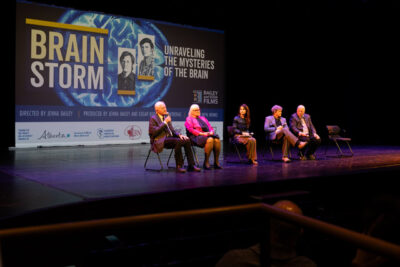‘Brainstorm’ documentary celebrates university neuroscientists on screen
By Alejandra Pulido-Guzman - Lethbridge Herald on February 13, 2025.
 photo by Kort Woycheshin
L- R: Bryan Kolb, Robbin Gibb, Maryam Kia (Phd student at U of L), Ian Whishaw, Robert Sutherland at a screening of Brainstorm.
photo by Kort Woycheshin
L- R: Bryan Kolb, Robbin Gibb, Maryam Kia (Phd student at U of L), Ian Whishaw, Robert Sutherland at a screening of Brainstorm.LETHBRIDGE HERALDapulido@lethbridgeherald.com
Lethbridge and area residents are invited to learn about brain health and to ask the experts some questions tonight at the University of Lethbridge during a special free screening of “Brainstorm.”
Brainstorm is a documentary produced by Bailey and Soda Films that highlights and celebrates the way University of Lethbridge neuroscientists transformed the field of neuroscience worldwide and how they change what we know about the brain.
Jenna Bailey, director of the film and adjunct assistant professor in the department of History and Religion at the University of Lethbridge, says she made the film alongside her husband Edgar Bermudez Contreras, who is also an adjunct assistant professor but in the Neuroscience department.
“The idea for the film was Edgar’s idea because he was working in the neuroscience department. And he said, ‘I think you should make a documentary about Ian and Bryan,” says Bailey.
 She says she was so impressed by what Ian Whishaw and Bryan Kolb have done right here in Lethbridge and how much impact their work has had on brain research worldwide, that she decided to make the film.
“I really felt like everybody should know about what they had achieved and the impact they made on neuroscience research worldwide. It’s very important to me to showcase this film locally. I am a community oral historian, and all of my projects are community focused,” says Bailey.
 She adds that the film is a celebration of what has taken place in Lethbridge, at the University of Lethbridge Neuroscience department.
 “The film is about how Bryan and Ian transformed the field of neuroscience worldwide, how they changed what we know about the brain. And it’s also about how they wrote the first textbook on the function of the human brain,” says Bailey.
Neuroscientist Bryan Kolb, says he was shocked when Bailey approached him about doing a documentary, because he did not believe people would be interested in it, but decided to agree.
The film has previously been shown at the Yates Memorial Theatre and Sterndale Bennet Theatre, with both events being ver well received.
“There were people from all over the place that had come for it. And I was just flabbergasted that people would come and see this. And then the feedback has been really good. People really liked it, so I guess I was wrong,” says Kolb.
He shares that he has been fascinated by the brain since a young age, but unfortunately back then not much was known about it, and even though they know a lot more now, there is still much to learn and to understand about the brain.
“We’re a long way from understanding all the details, but we know a lot more about it. Ian and I wrote a textbook basically on how human brain works. We probably started in 1980 and it’s now in its 8th edition. So, it’s done well,” says Kolb.
Bailey adds that the textbook is considered “the textbook” and has been translated into multiple languages and used worldwide.
When talking about the film, neuroscientist Ian Whishaw says there is two stories hidden within it, one being about their work, but the other being about the university itself.
“The first story is really about the creation of the university, because when we came to the university, neither ourselves nor anybody else knew anything about what an university was or how do you make one,” says Whishaw.
 He adds that when they attended the university, they did not have a campus, and everyone was working basically from scratch to create a university.
 “So, our little group is just part of that creation. And it’s kind of the story of how the university started from almost nothing to the comprehensive university that it is today,” says Whishaw. “And then the other part is just about what we did in terms of science here.”
But that is not all, Bailey adds that their “little group” as Whishaw calls it, created the first neuroscience department in Canada.
“They, together with the neurosciences that they hired and brought to the Canadian Centre for Behavioural Neuroscience, established prevention and therapy strategies for Parkinson’s research, Alzheimer’s disease, stroke and along with their colleagues, they established community programs to improve brain development in children,” says Bailey.
 She adds not only are their accomplishments astounding, but also the fact that they have done all that from right here in Lethbridge, Alberta.
The screening of Brainstorm will take place tonight from 6 p.m. to 8 p.m. at the BMO Auditorium in the Science Commons at the University of Lethbridge.
The event is free to attend but registration is required.
Those wishing to attend can register at  http://encompass.ulethbridge.ca/BrainStorm
26-25



My wife was diagnosed of Parkinson’s Disease at age 61. She had severe calf pain, muscle pain, tremors, slurred speech, frequent falls, loss of balance, difficulty in getting up from sitting position. She was put on Senemet for 6 months and then Siferol was introduced and replaced the Senemet. During this time span she was also diagnosed with dementia. She started having hallucinations and lost touch with reality. Last year, our family doctor started her on Uine Health Centre PD-5 formula, 2 months into treatment she improved dramatically. At the end of the full treatment course, the disease is totally under control. No case of dementia, hallucination, weakness, muscle pain or tremors. My wife is strong again and has gone on with her daily activities as I share this experience. I’m surprised a lot of PWP haven’t heard of PD-5 formula. we got the treatment from their website uinehealthcentre. com